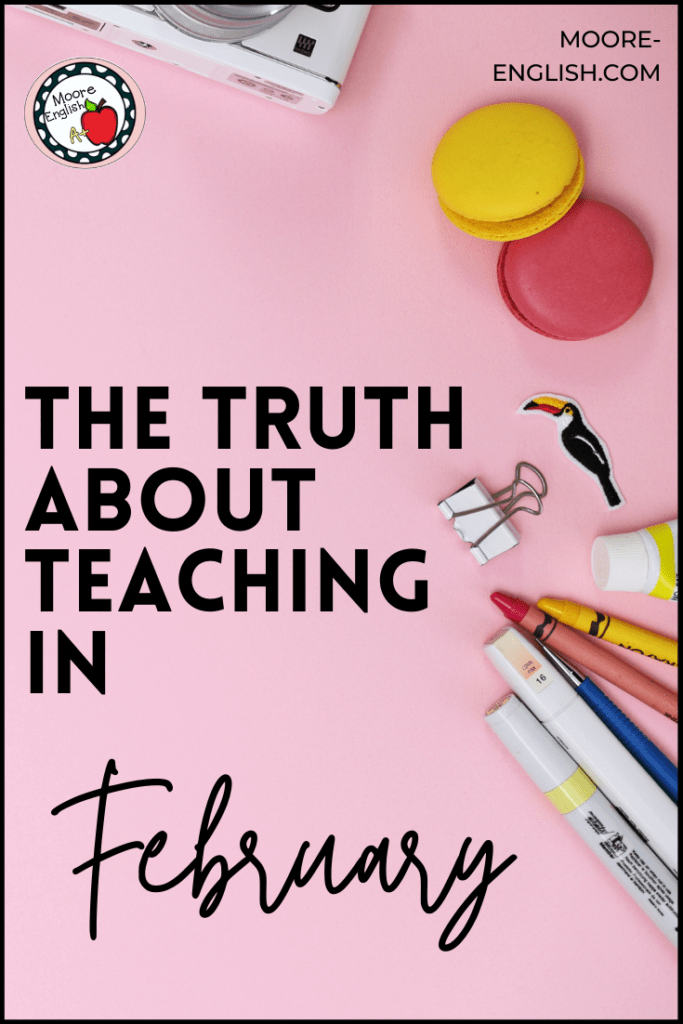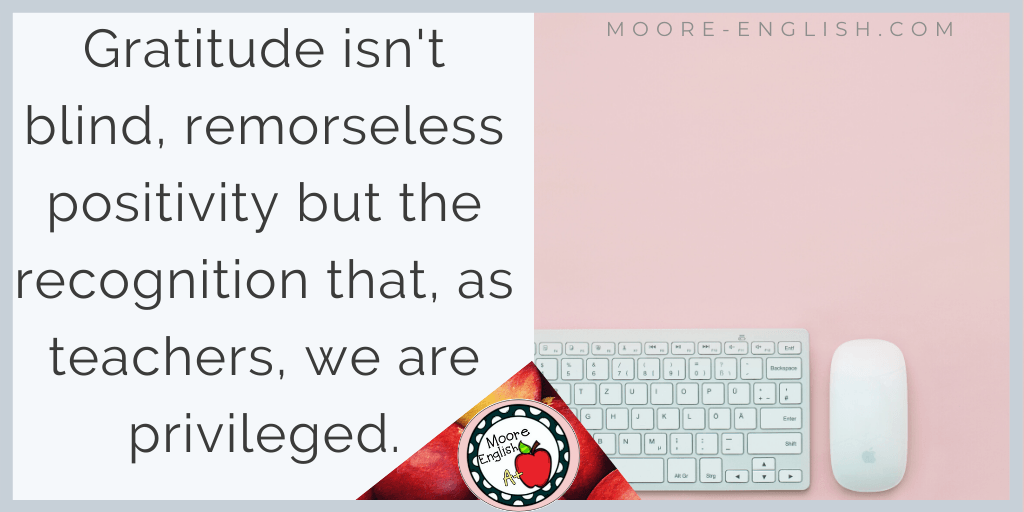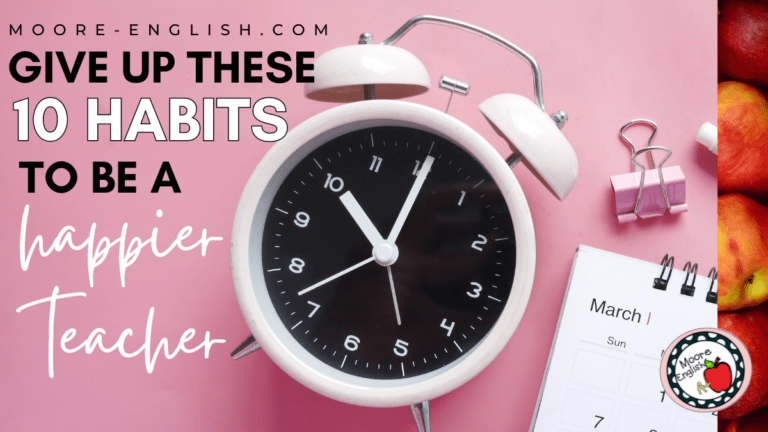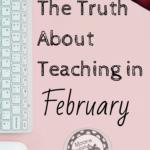One of my past students has graduated from high school, completed her degree, and started teaching fourth grade in my district. Yes, I feel old.
Recently, she reached out to check in and, in the process, let me know that her first year has been *HARD* (her emphasis). She’s spent some long nights, weekends, and days off in her classroom. More than anything, I sympathize with her and want to help out because she has no idea what’s coming.
To my mind, there are few months in education more brutal than February (March is a close runner up, but March Madness is a favorite). You feel like you’re past the halfway point, but the end is nowhere in sight. The weather is frigid, the testing buzz begins, and the only break is Presidents’ Day. In other words, winter has come, looked around, settled in, and shows no signs of offering a security deposit or regular rent check.
So what’s a teacher to do? How do you prepare for an unavoidable and almost cosmic alignment of rough days?
This post this post may contain affiliate links. Please read the Terms of Use.
Acknowledge the Challenge
First, recognize that this stretch during the school year is an absolute bear. Don’t go in blind (ignorantly or willfully). And don’t try to be a hero. Don’t try to wander through the Yukon when it’s forty below. Pride will leave you cold, so give this month its due and at least acknowledge the challenge.
Prepare Accordingly
Acknowledging the challenge is one thing, but if you recognize but don’t prepare, you haven’t made any progress. Knowing that February can be challenging gives you time to prepare.
Plan ahead: Since February can be a dark time with long stretches without a break, plan ahead. In the past, I’ve spoken about the importance of running weeklies and dailies ahead of time. This advice is even more important now: instead of leaving copying until the morning of, make those copies in advance. If possible, recruit a copy parent to help out with these kinds of grinding, thankless tasks.
Similarly, if you know you’re going to be hosting a Valentine’s Party, don’t leave the planning until the 13th. That will only create more stress. If you don’t have a head room parent, now is the time to elect one. Figure out what expectations your school has for this kind of celebration and plan ahead. This may take some time now, but when it gets to February 13, you will be ready. This is also true for February Parent-Teacher Conferences. Don’t wait until the night before to begin collecting data. Start collecting and organizing student data, work samples, and course recommendations now so when parent-teacher conferences arrive, you are not scrambling.
Additionally, with winter in the air, there’s a good chance your building will be hit with the plague or other student-carried illness. Be proactive in planning for absences by generating some generic sub plans ahead of time. Get your sub tub ready. This free Sub Plan Cover Sheet is a life saver!
Be consistent: If there’s one advantage to February, it’s that the calendar is pretty stable. There’s few early releases or late starts, no prolonged breaks, and only one four-day week. This means that you have an opportunity to really focus on consistency in the classroom. February’s charms are probably hitting your students, too, so they will need consistent expectations more than ever. Really lean into those expectations, procedures, and consistent routines so you can fall back on them when times get tough.
Respond…Responsibly
What many new teachers (like my past student) don’t know is that February is unforgiving. However, if you are a seasoned teacher, you do know what’s coming, so you have acknowledged the challenge and prepared accordingly. Now, it’s time to make sure that when challenges arise, you respond in the best way possible. We use best practices in our classroom, and that has to be true here, too.
Stay Together: When February digs in, it can be easy to take out our frustrations in petty ways. We may begin infighting with other teachers, lashing out at loved ones, or beating up on ourselves. Some of those reactions are unavoidable, but other times, we can catch ourselves and readjust. Instead of taking out your February frustrations on your co-workers, find a way to stick together. As High School Musical taught us, “we’re all in this together.” So find your teacher pack. Bring them your concerns and frustrations and let them help you. Chances are they will need your support, too. Hold each other accountable for positive behaviors and attitudes, but also create a safe space amongst yourselves for vulnerable moments. Yes, February will reveal countless vulnerabilities, but vulnerability is an opportunity for growth.
Stay Healthy: Germs are part of education. Keeping your classroom healthy is hard work. However, your classroom also belongs to your students, so they should be able to take on some responsibility for keeping the germs at bay. Invite students into this process by discussing good habits, including those habits that happen outside of the classroom like hand washing and getting enough sleep. Just as importantly, teachers also have to follow that advice, too. We also have to stay healthy by sleeping enough, practicing self care, and maintaining healthy habits even when February is at her most vicious. This means setting limits on work time, taking your sick days, and being reasonable with personal and professional goals. I even have an entire Pinterest board dedicated to finding school-life balance.
Stay Grateful
February is a petty, vindictive, selfish monster, but don’t let her ruin you. Don’t let her take away your joy of teaching. My word for 2019 is grateful (2020 is “sustainable” while 2021 is “sustain“), so it’s important for me to find ways to stay grateful even when teaching is its most difficult. Model gratitude for your students. Even when you don’t feel particularly #blessed, using grateful language with students can help you begin to believe it yourself. Gratitude isn’t blind, remorseless positivity but the recognition that, as teachers, we are privileged. The classroom can be a Pandora’s Box of sorts, and gratitude recognizes the awesome power that comes from opening that box.
Share your best advice for surviving February in the comments section!
Looking for most posts about self-care and school-life balance?
- How the Laundry Approach to Grading Made Me a Better Teacher
- 3 Ways to Find Peace of Mind When the World is in Pieces
- The Number 1 Greatest Lie About Teacher Self Care
- Confessions of a Recovering Teacher Martyr















